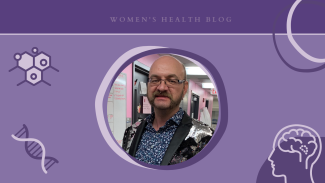Authors: Negin Nia and Arrthy Thayaparan (Blog Coordinators) || Interviewing: Dr. Troy A. Roepke, Associate Professor of Animal Science, Rutgers University
Published: January 28th, 2022
Our first Behind the Science for 2022 is a special feature with Dr. Troy A. Roepke. They are an Associate Professor of Animal Science at Rutgers University with a focused study on the effects of the steroidal hormone, estrogen. In our discussion, Dr. Roepke takes us through the motivations behind their work and their experience as a gay/genderqueer scientist.
Could you tell us a bit about your research?
There are two main areas that I study. The first is estrogen signaling, mostly in the brain, but sometimes in the periphery. I look at how estrogen controls reproduction, energy balance, stress, physiology, thermoregulation, mood, cognition, memory. The second is examining the impact or influence of endocrine disrupting compounds on those same physiological and behavioral parameters, especially compounds that interact with estrogen receptors.
What got you interested in pursuing that research?
I was trained as a marine biologist studying marine invertebrates. For my Ph.D. at the University of California-Davis, I studied the effects of endocrine disrupting compounds on sea urchin development and sea star reproduction. I found evidence for non-classical estrogen signaling in sea urchin embryos and got interested in that as a target for endocrine disruptors.
As I was finishing my degree, I was trying to find a postdoc in a marine biology lab interested in the same thing. Also, I was limited in my search for a postdoc because I didn't want to move to a state where there were no legal protections for my same-sex relationship. Sadly, I was not successful in obtaining such a postdoc due to this restriction in location. Nearing the end of my final year, a colleague of my Ph.D. advisor suggested I work with Dr. Martin Kelly at Oregon Health and Science University in Portland, Oregon, because he's one of the first people to demonstrate non-classical estrogen signaling, although in the mammalian brain. I contacted Dr. Kelly and he was interested in training me. Thus, I switched from studying things that didn’t have brains to studying the brain and learning all I could about estrogen signaling in the brain.
What sparked your interest in women’s health?
I study estrogen signalling, and that is very important to all sorts of women, and even some men and non-binary people. I think it is a simple leap that when your main expertise is studying estrogen signaling, you're also going to be interested in women's health.
Also, I primarily study female rodent models. The lack of inclusion of female animal models in the field of neuroscience itself is very distressing. I’ve been a big proponent of studying sex differences and sex as a biological variable because we need to be inclusive and that lends itself to focusing on women's health.
As someone who identifies as genderqueer, how have you found the science space?
In terms of, let's say the non-science part of science, I do see a greater acceptance and awareness for LGBTQ+ scientists than 30 years ago when I started and cisgendered and heterosexual scientists are trying to be more aware. Especially, the younger generation of scientists are more aware about pronouns usage and more accepting about that. That's given me a safer space to be open about my identity. But, it wasn't always that case. I came out in the early 90s, and there was a reasonable amount of hostility about being queer – so things have improved but there’s always more room for improvement!
But as for the science itself, many other scientists and I are push the idea that while it is important to study sex as a biological variable and study both male and female rodents, science needs to be very careful and inclusive in how we interpret those findings. We must reflect the real-world experience of all different types of people, who express different types of gender and don't identify as cisgendered. We are working in small and big ways to make sure that happens.
What impact do you hope to have on today’s world and the future?
I hope that some of my work in terms of science would be impactful, especially with flame retardants and showing how these chemicals that interfere with estrogen signaling can impact physiology and behavior in all sexes. That would help regulatory agencies make the best decision possible, hopefully. In terms of estrogen signalling, I hope that it will help impact how we view the brain in terms of sex and gender. And demonstrating how hormone replacement therapy for postmenopausal people, trans people, or anybody who needs it can impact their health.
